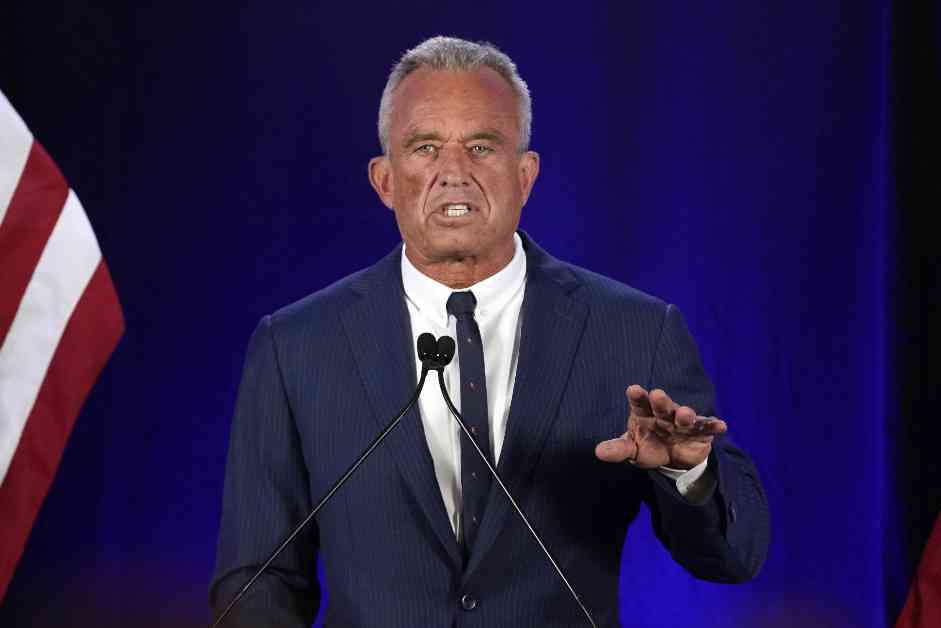Robert F. Kennedy Jr., the independent presidential candidate, made a surprising announcement on Friday during a speech in Phoenix. In a move that shocked many, Kennedy declared his support for President Trump and revealed his decision to suspend his campaign. He also stated that he would be removing his name from the ballot in 10 critical swing states that are likely to determine the outcome of the upcoming election.
Kennedy clarified that while he is suspending his campaign in these battleground states, he is not dropping out of the presidential race altogether. He urged his supporters in solidly red or blue states to continue to vote for him, emphasizing that he cannot in good conscience ask his staff, donors, or volunteers to continue supporting a campaign that he believes does not have a realistic chance of victory.
The Kennedy scion expressed his concern that by staying on the ballot in battleground states, he would risk splitting the vote and potentially handing the election to the Democrats. He emphasized that his decision to suspend his campaign was not a termination, but rather a strategic move to support President Trump in what he referred to as a “unity campaign.”
During his speech, which was live-streamed to over 1.5 million viewers, Kennedy announced his intention to collaborate with Trump on addressing what he called the “childhood disease epidemic.” This issue has been central to Kennedy’s campaign, particularly his controversial stance on vaccines, and has garnered significant support from his base.
Kennedy described the partnership with Trump as a “unity ticket,” drawing parallels to Abraham Lincoln’s Team of Rivals. He emphasized that despite their disagreements on certain issues, they would work together on shared priorities such as ending the forever wars, securing the border, protecting free speech, and addressing corporate influence in regulatory agencies.
The decision to endorse Trump was described by Kennedy as “heart-wrenching,” but he firmly believes that Trump represents the best hope for addressing the critical issues facing the country. The announcement came just one day after the Kennedy campaign filed paperwork to remove its name from the Arizona ballot, where Trump is polling slightly ahead of Vice President Harris.
Kennedy’s decision to suspend his campaign and endorse Trump has sparked mixed reactions among his supporters. Some have expressed disappointment, while others see it as a pragmatic move to support their shared goals. The move is seen as a strategic maneuver to consolidate support and maximize impact in the upcoming election.
The partnership between Kennedy and Trump is viewed as a significant development in the political landscape, with implications for the broader electoral landscape. The decision to create a “unity ticket” reflects a willingness to set aside partisan differences in pursuit of common objectives.
As the campaign progresses, the impact of Kennedy’s endorsement of Trump will be closely monitored. The decision to suspend his campaign in critical swing states and support the President represents a bold and unexpected move that has the potential to reshape the dynamics of the upcoming election.
Implications for the Election
Kennedy’s decision to suspend his campaign and endorse Trump has significant implications for the upcoming election. By removing his name from the ballot in key swing states, Kennedy is effectively consolidating support for Trump in these critical battlegrounds. This strategic move could have a decisive impact on the outcome of the election, particularly in states where the margin of victory is expected to be narrow.
The decision to create a “unity ticket” with Trump reflects a pragmatic approach to politics, focusing on shared goals rather than partisan divisions. This move could appeal to voters who are disillusioned with traditional party politics and seek a collaborative approach to addressing pressing issues.
Kennedy’s endorsement of Trump is likely to energize both his supporters and Trump’s base. The partnership between the two candidates could galvanize voters who are looking for alternatives to the traditional two-party system and are drawn to the idea of unity and cooperation across party lines.
Reactions and Responses
The announcement of Kennedy’s endorsement of Trump has elicited a range of reactions from various quarters. Supporters of Kennedy have expressed mixed feelings, with some voicing disappointment at his decision to suspend his campaign. Others have expressed support for his pragmatic approach and willingness to work with Trump to achieve common objectives.
Critics of Kennedy’s decision have raised concerns about the implications for the broader political landscape. Some have questioned the wisdom of aligning with Trump, citing his controversial policies and divisive rhetoric. However, Kennedy has defended his decision, emphasizing the need to prioritize shared goals and work towards solutions to pressing issues.
The response from the Trump campaign has been positive, with a press release describing Kennedy’s endorsement as “good news” for the President’s re-election bid. The partnership between Kennedy and Trump is seen as a strategic move to consolidate support and maximize impact in the upcoming election.
Looking Ahead
As the election draws closer, the impact of Kennedy’s endorsement of Trump will become increasingly clear. The decision to suspend his campaign in critical swing states and support the President represents a bold and unexpected move that has the potential to reshape the dynamics of the election.
The partnership between Kennedy and Trump could have far-reaching implications for the future of American politics. By setting aside partisan differences and focusing on shared goals, the two candidates are sending a powerful message about the importance of unity and cooperation in addressing pressing challenges.
Overall, Kennedy’s endorsement of Trump represents a significant development in the political landscape, with implications for the broader electoral landscape. The decision to create a “unity ticket” reflects a pragmatic approach to politics, emphasizing collaboration and shared objectives over partisan divisions.


